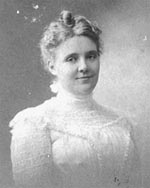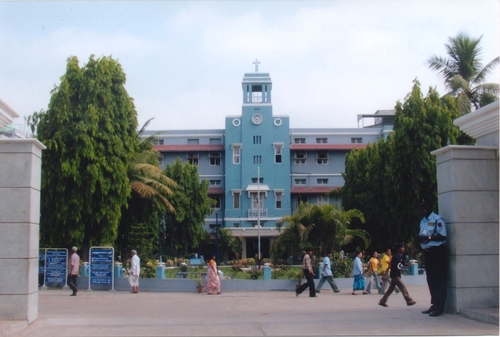Ida Scudder vowed that she would never go back to India as a missionary like her  parents and grandparents! She was attending college in America when she got word from her father, who was serving as a doctor in India, that her mother was unwell. Ida had been born in India on December 9, 1870, and lived there until about age five. Her parents had brought her back to the United States to finish her education and then left her there when they returned to India. Ida was happy. She did not wish to return to India. She wanted to get married and have a nice home and all the things that other girls in America had. In India, she had seen too many starving and sick people. The misery was more that she wanted to think about. She told her college friends that as soon as her mother was well, she would return to America.
parents and grandparents! She was attending college in America when she got word from her father, who was serving as a doctor in India, that her mother was unwell. Ida had been born in India on December 9, 1870, and lived there until about age five. Her parents had brought her back to the United States to finish her education and then left her there when they returned to India. Ida was happy. She did not wish to return to India. She wanted to get married and have a nice home and all the things that other girls in America had. In India, she had seen too many starving and sick people. The misery was more that she wanted to think about. She told her college friends that as soon as her mother was well, she would return to America.
She went to India, and was helping her father and mother at a mission bungalow in 1892. On one night, God changed her mind about being a medical missionary in India. This story is incredible and shows how Ida received her extraordinary call to serve helpless women in India for the rest of her life.
She had been sitting in her room reading, when a high-caste Brahmin stepped onto their veranda. His young wife, only fourteen, was in labor and having a terrible struggle to stay alive. He begged Ida to come and help him. The barber women – India’s midwives – had done as much as they could. Without more help, his wife would die.
Ida replied that she knew nothing about childbirth. She told him that her father was a doctor and as soon as he returned home, she would bring him to help. The Brahmin replied that that would not be possible. No foreign man had ever entered the house. His wife would just have to die if Ida could not help her. Ida told him she was sorry, but could do nothing. She went back to reading her book.
In a little while, she heard footsteps on her veranda again. She thought maybe the Brahmin had come back, but no, it was a Mohammedan. “Please,” he pleaded with her, “come help my wife.” She was dying in labor. Ida’s father, Dr. John Scudder, had returned home by then. He offered to go, but the Mohammedan refused. No man outside of his family had ever looked on his wife’s face. Ida and her father offered to go and help as best as they could, but the Mohammedan refused.
Ida returned to her room, but was restless and could not read her book. In only a little while, she heard footsteps for the third time. This time the man was a high-caste Hindu, and he also had a young wife that was dying in labor. Would Ida please come? Only a woman may look on his wife. Ida could only reply as she had to the others. Without her father’s help she could do nothing.
Ida was restless all night and could not sleep. She spent the entire time in anguish and prayer. She did not want to work in India. She wanted the good life with her friends in America. But she could not stand the thought of all of the young women who would die without help. She prayed for guidance. Later she wrote, “I think that was the first time I ever met God face to face, and all that time it seemed that He was calling me into this work. Early in the morning I heard the “tom-tom” beating in the village and it struck terror in my heart, for it was a death message. I sent our servant, who had come up early, to the village to find out the fate of these three women, and he came back saying that all of them had died during the night . . . Again I shut myself in my room and thought very seriously about the condition of the Indian women and, after much thought and prayer, I went to my father and mother and told them that I must go home and study medicine, and come back to India to help such women.”
Ida did give up all thoughts of marriage. She went back to the United States and studied medicine at Cornell Medical College in New York City. She graduated in 1899 as part of the first class at that school that accepted women as medical students.
Ida returned to India in 1900. She was a well-trained doctor, and she had in hand a gift of $10,000 from Mr. Schell, a Manhattan banker, to build a hospital. The mission leaders had told her to raise the money before she left. She knew that she would be leaving in only a week, but trusted God. He did indeed perform a miracle for the mission. The head of a missionary society had given Ida Mr. Schell’s name and asked her to call on him. Mr. Schell was known as a tightwad, but Ida was hopeful for at least a $500 donation. Ida did not know that Mr. Schell had heard about the work in India and was willing to help. He wrote a check for $10,000 and gave it to her and asked only that the hospital be named after his wife, Mary Taber Schell.
Ida was ecstatic. She returned to India and eventually founded not only the hospital (built in 1902), but also a medical school at Vellore, 75 miles from Madras, to train other nurses and doctors. The need in India was great. In 1900 there was only one trained doctor for every 10,000 people.
(built in 1902), but also a medical school at Vellore, 75 miles from Madras, to train other nurses and doctors. The need in India was great. In 1900 there was only one trained doctor for every 10,000 people.
There are so many good resources about Ida Scudder, and indeed her whole family. She was a third generation medical missionary. The tradition in their family continues to this day even to a fifth generation. I will not go into more details here. I would like to mention that on this particular blog, you can have a special treat that has not been available for many of the women that I have written about. You can listen to Ida’s own voice, recorded in the 1950’s, telling her story. Here is the web address:
In 1953, when Ida was 82 years old, she was presented with the Elizabeth Blackwell Citation of the New York Infirmary as one of five outstanding women doctors of 1952. Ida died at her home on Hilltop, a bungalow at Kodaikanal, overlooking the Vellore Christian Medical College and hospital, at age 89. The girl who promised she would never set foot in India again, served there until the day she died.
By 2003, the Vellore Christian Medical Center was the largest Christian hospital in the world, with 2000 beds, and its medical school is one of the premier medical schools in India.
Ida Scudder is a wonderful example to us of compassion and courage. She had her mind made up to a normal life of marriage and children, but was faithful to respond to God when He impressed her with the need of the women in India. How many of us will give up even a couple of cups of coffee each month and send some money to a mission, let alone travel to a place where there is only hardship and suffering and dying. She is an encouragement to us to think of others. We might feel that we can’t do much in our own small corner in our world, but with a vision to help others, and God’s help, we can really do much to brighten the lives of others around us.

